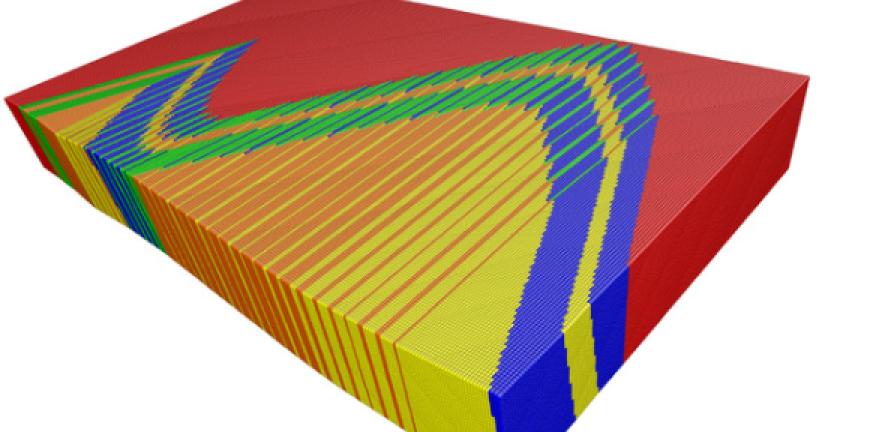
Isaac Newton Institute
Photo Credit: Y. Song, X. Chen, V. Dabade, TW. Shield and R. D. James, Enhanced reversibility and un- usual microstructure of a phase-transforming material, Nature, 502(2013): 85.
Background
Complex materials have extraordinary and unique features which are usually determined by their rich microsctructures. They are key components to many of the emerging applications we take for granted in our everyday lives – in liquid crystal displays, microsensors and actuators, miniaturised phones, light but tough metals in cars, biological implants, composites for aerospace and many more.
Mathematics plays an important role in ensuring that technological advances in complex materials continue. It is integral to the design of such materials with desirable functionalities. However, the theoretical understanding and modelling of them have so far been quite inadequate. Mathematical modelling and understanding is a key enabler for complex material development and further promotes greater potential of these materials with actual engineering applications.
Some of the mathematical areas that are directly relevant to the key scientific questions of interest include optimisation and calculus of variations, geometry and topology, continuum mechanics and partial differential equations. The study of such common principles and techniques will aid the advancement of optimal material design and its more broad application.
This knowledge exchange workshop was part of the six months Research Programme at the Isaac Newton Institute (INI) on The Mathematical design of new materials. It brought together mathematicians and scientists working in various areas of materials science and applied mathematics in order to initiate a systematic study of the optimal design of new complex materials.
Aims and Objectives
This workshop aimed to highlight how mathematical modelling provides a rational way for understanding of complex materials properties and guiding the development strategy for such materials. Mathematical modelling forms the theoretical foundation for modern materials development. As well as being a descriptor for complex materials, such models are often the key to the discovery of the singular and unusual properties of the material.
A focus for the day was on the interesting classes of complex materials - shape memory alloys (SMAs) and those involving phase transformations. These materials have remarkable properties, including the ability to ‘memorise’ or retain their previous shape when subjected to certain stimulus such as thermomechanical or magnetic forces. Due to their unique and superior properties, they can be found in a broad range of commercial areas and have great potential in emerging applications and this event focussed on the following industry application areas:
- Medical devices
- Energy
- Robotics
This workshop featured talks from leading academic researchers, as well as end users presenting challenges from the medical devices, energy and robotics industries. It brought together mathematicians and scientists working in various areas of materials science and applied mathematics to further investigate opportunities in the mathematical modelling to enable optimal design of complex new materials.
Posters
There was a poster exhibition running alongside the workshop and during the drinks reception.
Registration and Venue
There was no registration charge for this event.
The workshop took place at the Isaac Newton Institute for Mathematical Sciences in Cambridge. Please see the Isaac Newton Institute website for further information about the venue.
Feedback Form
Please use this link to complete the feedback back form following attendance at this workshop

